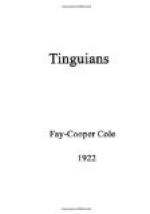Small children are generally left with the mother, but when they are old enough to decide, they may choose between their parents. However, the father must aid in the support of his offspring, and they share in his property when he dies. Either party to a divorce may remarry at any time.
The Tinguian recognize only one wife, but a man may have as many concubines (pota), as he can secure. The pota lives in a house of her own, but she is held somewhat in contempt by the other woman, and is seldom seen in the social gatherings or in other homes. Her children belong to the father, and she has no right of appeal to the old men, except in cases of cruelty. Men with concubines do not suffer in the estimation of their fellows, but are considered clever to have won two or three women.
The pota is generally faithful to one man, and prostitution is almost unknown. Unfaithfulness on the part of a betrothed girl, or wife, or even a pota is almost certain to cause serious trouble, and is likely to end in a murder.
The early pledging and marriage of the children has reduced illicit sexual intercourse to a minimum; nevertheless, it sometimes happens that an unbetrothed girl, not a pota, is found to be pregnant. In such a case the man is expected to make a gift of about one hundred pesos to the girl’s people, and he must support the child when finally it comes into his keeping. Neither party to such an occurrence loses standing in the community unless the father should fail to redeem the child. Should this happen, he would be a subject of ridicule in the community, and a fine might also result. The usual outcome of such an illicit union is that the girl becomes the pota of her child’s father.
Death and Burial.—Sickness and death are usually caused by unfriendly spirits; [89] sometimes Kadaklan himself thus punishes those who refuse to obey the customs; sometimes they are brought about by mortals who practise magic, or by individuals themselves as punishment for violated taboos; and finally violent death is recognized as coming from human agency.
The methods of cajoling the spirits, of overcoming magic, and thwarting evil designs are discussed in another chapter (cf. pp. 295 et seq.). If all these fail, and the patient dies, the family and relatives at once don old garments, and enter on a period of mourning, while friends and relatives assist in the disposal of the corpse.
A funeral is a great event in a Tinguian village. The dead is bathed, “so that his spirit [90] may be clean,” and is placed in a bamboo seat at the end of the house. This seat, which is known as sangadel, is constructed by placing three long bamboo poles against the wall and resting a frame of bamboo slats on them, to a height of about three feet. A mat is attached to the top, and is stretched onto the floor in front.




